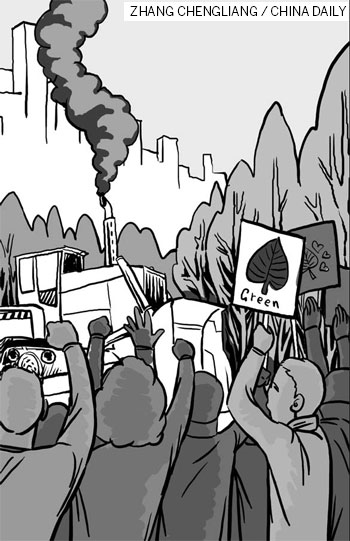

Which would you rather have in your neighborhood - a grove of large trees, or a busy street lined with dozens of bars?
Too bad nobody cared what the residents of Shijingshan district wanted. As usual, officials simply went ahead with their own secret plans to transform the neighborhood.
Only a fence that suddenly blocked off the woods next to Shijingshan Amusement Park alerted residents that something was about to happen to one of their favorite gathering spots.
Local tourism authorities intend to cut the trees to make way for a parking lot to serve the customers of 60 bars they want to build on a new commercial street.
When residents protested, the authorities told them the bar-building project meets the principles of "rational development". Let's examine their viewpoint.
Local officials looking at a big development see lots of money. There will be fees levied against every business involved. Endless taxes will be collected on the bars there.
And those are only the most obvious revenue opportunities. In a project this size, creative bureaucrats can concoct many more.
It's not just money they see. Visions of new luxury cars, expensive apartments, gold watches, fancy vacations and early retirements dance in their heads.
OK, now they look at a bunch of trees. What do they see? No money.

From that point of view, of course 60 bars and a parking lot look more "rational" than a grove of trees.
There's even a euphemism for this that attempts to give such projects a gloss of justification. In the jargon of real estate development, whatever makes the most money per square meter constitutes the "highest and best use" of that property.
With 60 bars packed along one thoroughfare, the development is certain to achieve its "highest" use.
Perhaps officials overlooked the noise, garbage, crime and traffic this plan will cause, and the higher taxes residents must pay to provide services that deal with those problems. Not that this will affect those who issue the permits. They'll be able to afford living in a quiet, safe, attractive neighborhood - one with lots of trees, which increase the value of their properties.
Besides their beauty, trees cool temperatures by providing shade.
Trees for Cities, an international nonprofit based in London, says trees benefit urban stormwater sewers because they reduce rainstorm impact. They filter air pollutants, especially dust, which lowers asthma rates and prevents smog from forming as easily.
Trees also cut greenhouse gas emissions because they absorb carbon dioxide.
They provide relief from landscapes dominated by concrete and give shelter to wildlife.
Wouldn't it be pleasant to enjoy the songs of birds that don't live in cages?
Research suggests that the presence of trees reduces stress and can even help lower crime rates.
Residents of Shijingshan have been enjoying the grove for 20 years. They're used to gathering among the trees every morning to exercise.
Officials told them they could exercise in the parking lot.
Right. Stretch and breathe deeply while dodging cars and inhaling gas fumes.
The way local authorities have handled this illustrates perfectly the saying "They can't see the forest for the trees." It refers to people who can't see the big picture because they are too focused on details.
In this case, officials have focused on the profits to be made by a favored few. That narrow view, based on self-interest, doesn't include the bigger picture of what is good for neighborhood residents.